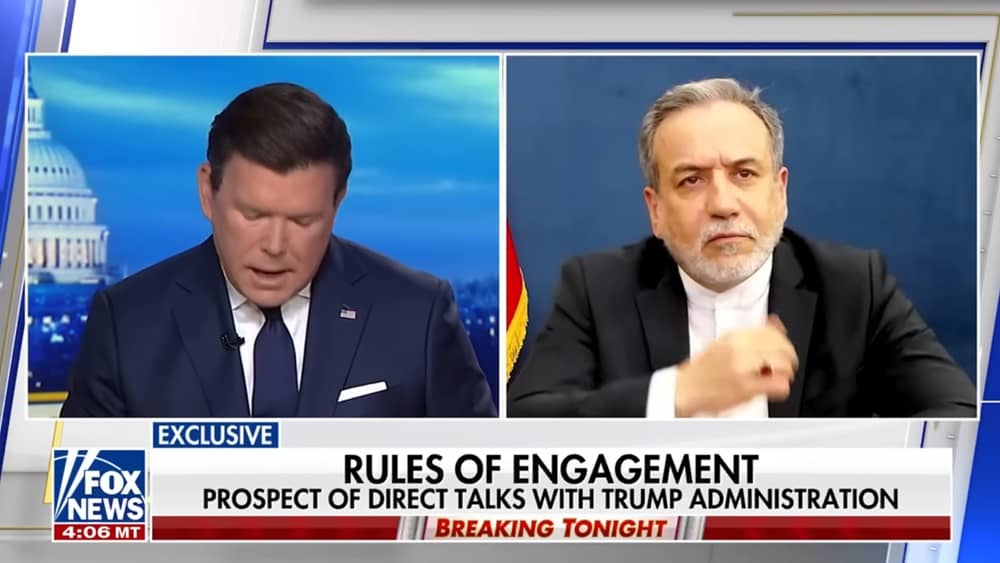Facebook
Twitter
LinkedIn
Pinterest
Reddit
Email
Print
 Fox News interview with Abbas Araghchi, the Iranian regime’s Foreign Minister on July 22, 2025
Fox News interview with Abbas Araghchi, the Iranian regime’s Foreign Minister on July 22, 2025
Three-minute read
Despite regime Supreme Leader Ali Khamenei’s repeated calls for unity, deepening internal divisions within the Iranian regime have once again come to the fore. A striking example of these internal rifts emerged on July 22 when Keyhan—the mouthpiece of Khamenei’s office—launched a scathing attack on Foreign Minister Abbas Araghchi over his televised interview with Fox News.
In its editorial titled “Trump’s Big Mistake After Begging for a Ceasefire,” Keyhan condemned Araghchi’s remarks as weak and misguided, portraying them as a diplomatic blunder that undermined the regime’s official narrative. The paper accused Araghchi of offering “a plea for a ceasefire,” framing his tone and content as unbefitting of the regime’s supposedly defiant stance.
The criticism centered on Araghchi’s public acknowledgment of the extensive damage inflicted on Iran’s nuclear facilities by recent U.S. strikes and his expression of readiness to negotiate with Washington. According to Keyhan, these statements served only to embolden U.S. President Donald Trump, who cited Araghchi’s remarks in subsequent public comments.
#Khamenei Breaks Silence in Bid to Shore Up a Fractured Base After 12-Day Warhttps://t.co/DB9Rw7kNJn
— NCRI-FAC (@iran_policy) July 17, 2025
“On the morning of Tuesday, July 22, US President Donald Trump… once again, in a farcical show, threatened the Iranian government with targeting nuclear facilities again,” Keyhan wrote, arguing that Trump’s aggression was fueled by Araghchi’s soft rhetoric.
The newspaper also accused Araghchi of “legitimizing enemy propaganda.” “In sensitive circumstances of psychological warfare and media battles,” Keyhan warned, “choosing the right platform becomes doubly important.” The editorial expressed concern that some parts of Araghchi’s message were misinterpreted or misused by the opposition due to a lack of media coordination.
Perhaps the most controversial element of the criticism was Keyhan’s attack on Araghchi’s comments regarding Israel. During the interview, Araghchi stated that the regime had never sought to assassinate foreign leaders and denied any policy to destroy Israel—remarks that clashed directly with well-documented statements by the regime’s top figures. Keyhan reminded readers that Ruhollah Khomeini, the regime’s founder, had explicitly called for Israel to be “wiped off the map,” and that Khamenei has consistently reaffirmed this stance. The newspaper argued that Araghchi’s statements directly contradicted these foundational policies.
#Iran State Media Turns Aggressive Post-Ceasefire, with Kayhan Demanding Grossi’s Executionhttps://t.co/X2hHxof9KI pic.twitter.com/tfyuei1yBe
— NCRI-FAC (@iran_policy) June 29, 2025
The editorial went further by quoting fatwas from senior regime clerics—Ahmad Alamolhoda, Nasser Makarem Shirazi, and Hossein Nouri Hamedani—who have publicly called for the assassination of American and Israeli leaders, labeling them as “corruptors on earth” and “moharebs” (enemies of God). This stark contrast between Araghchi’s tone and the pronouncements of the regime’s religious elite underscores the growing divide within the regime’s ranks.
International reactions have added another layer of complexity. U.S. Ambassador to NATO Matthew Whitaker dismissed Araghchi’s credibility in an interview with Fox News, saying, “I don’t believe a single word that the Iranian foreign minister says. He’s not a credible voice for peace.” Whitaker emphasized that the U.S. remains firm in its demand that Iran must never acquire a nuclear weapon, especially following what he described as the destruction of significant parts of Iran’s nuclear infrastructure.
As Snapback Sanctions Loom, #Tehran’s Bluster Reveals a Regime in Panichttps://t.co/Jh2d7MpFsy
— NCRI-FAC (@iran_policy) July 17, 2025
This public discrediting of Araghchi by both hardliners within Iran and foreign diplomats signals a broader crisis within the regime. His attempt to project a diplomatic image has not only failed to gain international trust but has also drawn fierce backlash from within the regime itself.
As tensions escalate and the regime faces mounting domestic and international pressure, its internal contradictions are becoming harder to suppress. The sharp rebuke from Keyhan—an outlet tightly aligned with Khamenei—illustrates the extent of the regime’s internal turmoil. What began as a media appearance by the foreign minister has now turned into a vivid display of the ideological fractures at the heart of the regime.